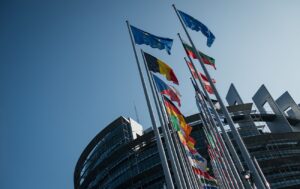
A two-day EU summit will open Thursday in Brussels.
“We will reaffirm even more decisively our commitment to support Ukraine for as long as it takes, including through sustained financial and military assistance. We must also discuss how to further strengthen international support for the Ukrainian peace formula,” European Council President Charles Michel wrote in an invitation letter to EU heads of state and government for the European summit.
The meeting of the European Council may also touch upon the latest developments in Russia in connection with the discussion of Ukraine. This issue was not raised during preparations for the summit, so there are “high expectations” from its consideration, a high-ranking EU official who commented on the agenda on condition of anonymity on the eve of the meeting told reporters.
At the same time, the source said the EU will continue to work on how to use frozen Russian assets to help rebuild Ukraine. However, he stressed, it is a complex and ambiguous issue.
“There will be a debate. I don’t know what the outcome will be. In any case, the topic is very controversial, very technical, and there are a whole series of side effects,” the EU functionary continued.
He said tackling it requires caution and coordination with G7 countries because “it seems simple, but there are a number of consequences.”
“We can’t do whatever we want. You can’t take (other people’s) money and put it in your wallet. We abide by the principles of the rule of law. When assets are frozen, you have to be able to get them back as soon as the incriminating behavior stops. So you have to be able to get that money back: the whole asset and the interest on it,” explained the senior source.
“That’s why it’s difficult,” he said, adding that such sanctions are a signal to everyone, including investors, and some investors will wonder what could happen to their funds if they get on the sanctions list. “So you have to think about the side effects of these measures,” the journalist’s interlocutor said.
The European official pointed to the legal complexities of the problem, explaining that an ill-considered decision could be made and then lawsuits would follow, and that would defeat the purpose sought.
Michel, in his message to EU leaders, also said: “Our meeting will be preceded by a lunch with NATO Secretary General Jens Stoltenberg, with whom we can exchange views on global and European security.”
The president of the European Council recalled that in Versailles in 2022, the leaders of the EU member states “decided to take on greater responsibility for European security and defense.” Now, he said, “it is time to assess what we have achieved and to discuss how to speed up our work in order to meet our commitments.”
The European Council meeting will include an exchange of views on the economic situation of the union. “I would like us to assess progress in improving our competitiveness, strengthening our economic base and enhancing our economic security and sustainability, reflecting on further actions that may be needed,” Michel wrote in an invitation letter.
EU leaders will address the migration situation. Mentioning the recent tragic migrant shipwreck in the Mediterranean Sea, the president of the European Council called it “a stark reminder that we must continue to work tirelessly to solve the European migration problem.”
EU heads of state and government will once again turn their attention to the PRC. “Regarding China, we will give further guidance after our debate in October and the debate held by the foreign ministers in May. This will be an opportunity to reaffirm our unified position on China,” Michel noted.
He listed a number of other foreign policy issues that he believes deserve the attention of the European Union’s top leadership. These include the upcoming European Union-Latin America and Caribbean Community summit, EU relations with partners in the southern neighborhood and developments in the Western Balkans.
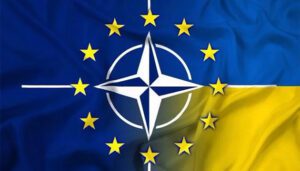
The NATO leadership has decided to transfer the personnel of its Ukrainian mission to Lviv and Brussels in connection with Russia’s invasion of Ukraine, Oksana Musiyenko, press officer of the NATO Information and Documentation Centre, told Suspilne.
“NATO and allied countries are monitoring and assessing the situation very closely and continue to take all necessary measures. The safety of our personnel is a top priority, so the personnel have been transferred to Lviv and Brussels,” Musiyenko said.
At the same time, she noted that NATO offices in Ukraine continue to work.
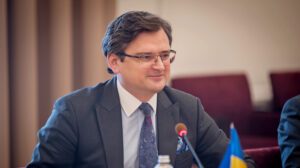
On Thursday, June 24, Minister of Foreign Affairs of Ukraine Dmytro Kuleba, together with Deputy Prime Minister, Minister of Foreign Affairs of Georgia Davide Zalkaliani and acting Prime Minister, Minister of Foreign Affairs and European Integration of the Republic of Moldova Aureliu Ciocoi will visit the EU institutions in Brussels for the first time with a joint visit in the format of the Associated Trio, the Ukrainian Foreign Ministry reported.
According to the press service of the Foreign Ministry, in the information released Wednesday morning, the heads of the Ukrainian, Georgian and Moldovan diplomacy will present to the European Union a joint strategic vision of the further development of the trilateral format of the Associated Trio.
The key topics of the talks will be the European integration of the three countries, the possibility of further liberalization of trade relations, new promising areas of sectoral cooperation with the EU, in particular in the context of the implementation of the European Green Deal and the digital transition.
The parties will also coordinate their positions on security threats in the region and exchange views on preparations for the Eastern Partnership summit in December 2021.
Ukraine, Georgia and Moldova signed a memorandum on the establishment of the Associated Trio in Kyiv on May 17, 2021. The document underlines the European aspirations of the three associated partners of the EU and their ambitions to become members of the European Union. The Associated Trio is a trilateral format in which Ukraine, Georgia and Moldova coordinate their efforts towards European integration.
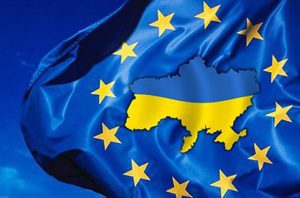
Ukraine and the European Union have agreed on further economic integration and regulatory convergence in a number of areas.
A joint statement by the leaders of Ukraine and the EU, adopted at the end of the summit in Brussels on Tuesday, says.
“We looked forward to further enhancing economic integration and regulatory approximation within the framework of the Association Agreement in the following fields: on digital, we took note of the on-site assessment of the implementation of Ukraine’s commitments in the AA/DCFTA. We also discussed the EU’s engagement in further supporting Ukraine and its institutions in approximation with and gradual implementation of the EU Digital Single Market acquis and institutional capacities, to fully benefit from the Association Agreement. We agreed to prepare by the end of 2020 a joint working plan for co-operation between EU and Ukraine on electronic trust services with a view to a possible agreement which must be based on approximation to the EU legislation and standards,” the statement reads.
The leaders welcomed progress on the update of the Annexes on telecommunication, environment, climate and financial cooperation of the Association Agreement. “Welcoming Ukraine’s ambition to approximate its policies and legislation with the European Green Deal, we stressed the importance of progress in Ukraine’s commitments in the areas of climate change, environment, marine ecosystem, education, energy, transport and agriculture, building on existing established sectoral dialogues, and agreed on a focused dialogue on the necessary steps in these areas,” the statements says.
In addition, they acknowledged the importance of fully complying with DCFTA commitments, notably in the areas of intellectual property rights, public procurement, trade defence, and sanitary and phytosanitary standards with a view to building an open and predictable business and investment climate in Ukraine. “We agreed to further discuss and review the ways to improve DCFTA implementation in order to further develop and facilitate bilateral trade,” the leaders said.
They also welcomed the launch of the pre-assessment on Ukraine’s preparedness on an Agreement on Conformity Assessment and Acceptance of Industrial Products.
The EU also welcomed Ukraine’s willingness to associate to the incoming EU’s Research and Innovation Framework Programme Horizon Europe and EU4Health Programme, which will be a significant enabler for green and digital post-COVID recovery.
“We recalled the importance and reaffirmed our commitment to concluding the Common Aviation Area Agreement at the earliest possible date,” the statement notes.
What is more, the EU reaffirmed Ukraine’s role as a strategic transit country for gas and welcomed the agreement on gas transit to the EU after 2019. “We underlined the importance of pursuing the modernization of the Ukrainian national gas transmission system and further cooperation on strengthening European energy security. We stressed the importance of Ukraine’s cooperation with the EU, with a view to its integration with the EU energy market based on effective implementation of the updated Annex XXVII of the Association Agreement as well as coordination of further steps for the integration of gas and electricity markets,” it says.
The parties also agreed to improve connectivity between Ukraine, the EU and other countries of the Eastern Partnership with a view to facilitating trade, further developing safe and sustainable transport links and supporting people-to-people contacts.
“We welcomed the participation of Ukraine in EU programmes and underlined the importance of Erasmus+ for education, training, youth and sport and Creative Europe for culture. We looked forward to intensifying the relevant cooperation in the framework of current and future programmes,” the leaders said.
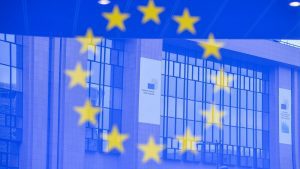
The 22nd Ukraine-EU summit will be the first bilateral EU summit with a third country held physically in Brussels since the outbreak of the coronavirus (COVID-19) pandemic.
The European Council said on Friday that the EU side will be represented by Presidents of the European Council Charles Michel and President of the European Commission Ursula von der Leyen. Ukraine will be represented by President Volodymyr Zelensky. High Representative of the EU for Foreign Affairs and Security Policy Josep Borrell will also participate.
During the meeting, the leaders will review bilateral relations, including the socio-economic impact of the COVID-19 pandemic and the EU support to Ukraine; the next steps in the implementation of the Association Agreement, including its Deep and Comprehensive Free Trade Area; the state of reforms in Ukraine.
Leaders will also discuss the conflict in eastern Ukraine, recent developments in Belarus and further regional and foreign policy issues.
It is expected that at 15:30 Brussels (16:30 Kyiv time) on Tuesday, EU leaders will meet the Ukrainian president, and at 17:50 Brussels time (18:50 Kyiv time) a press conference is scheduled to be held in the virtual mode.
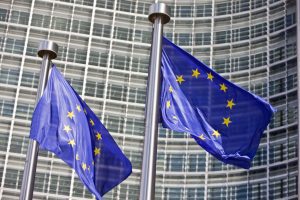
The EU-Ukraine Summit will take place in Brussels on October 6.
The corresponding agreement was reached during a telephone conversation between Presidents of the European Council and Ukraine, Charles Michel and Volodymyr Zelensky, Michel said on his Twitter page. “In my call with President of Ukraine Volodymyr Zelensky and I agreed to meet, together with President Von der Leyen in Brussels on 6 October for the 22nd EU-Ukraine summit,” he wrote.
Previously, the summit was scheduled for October 1.